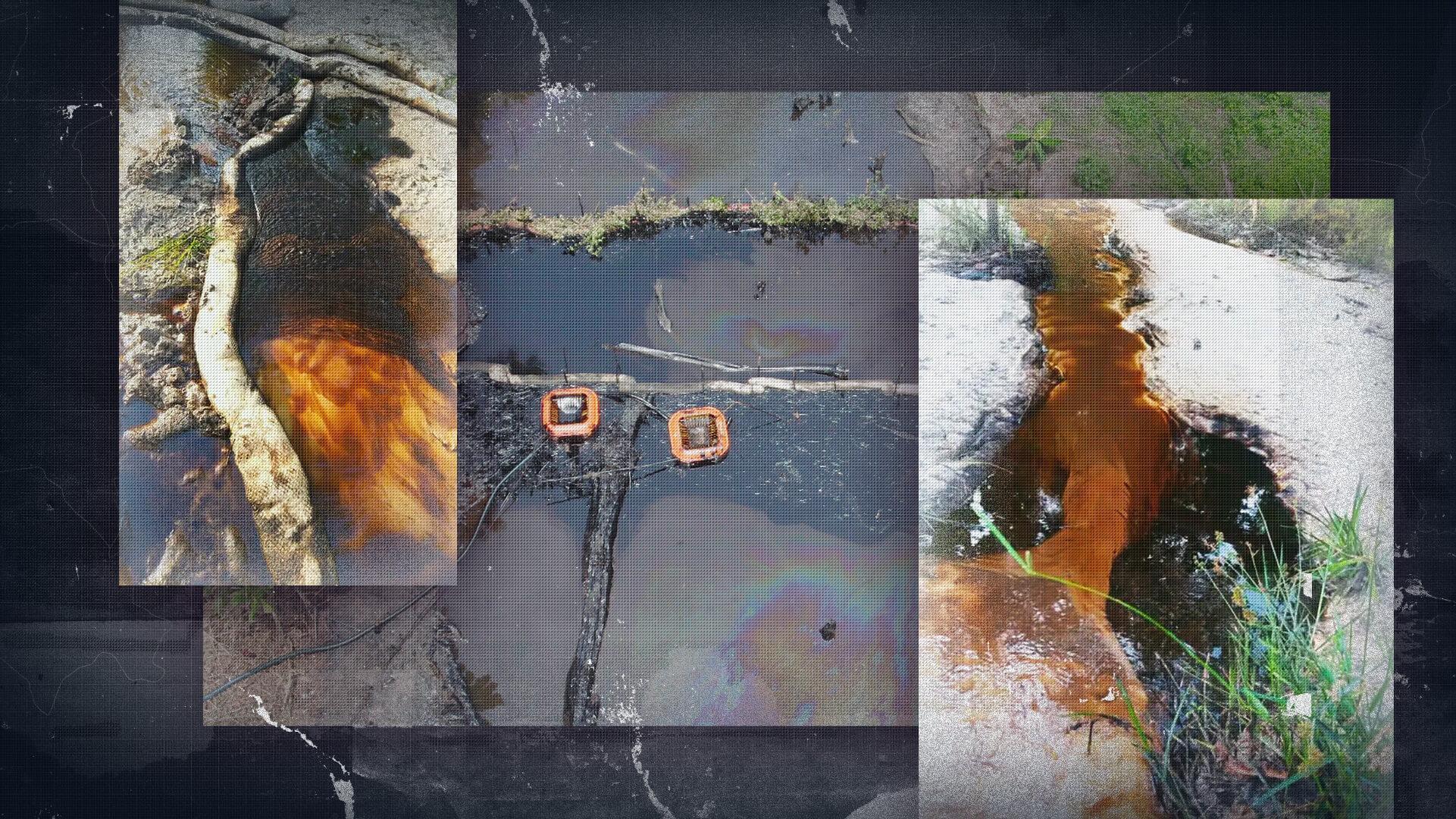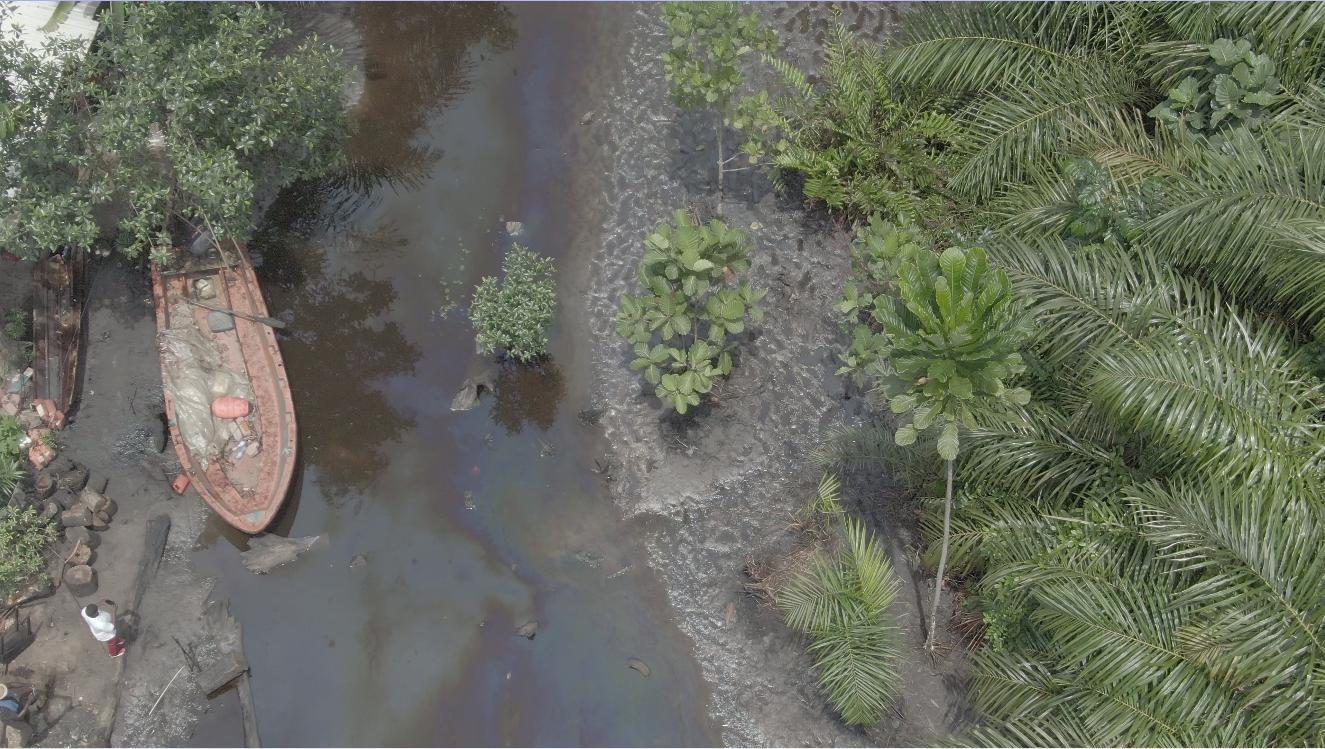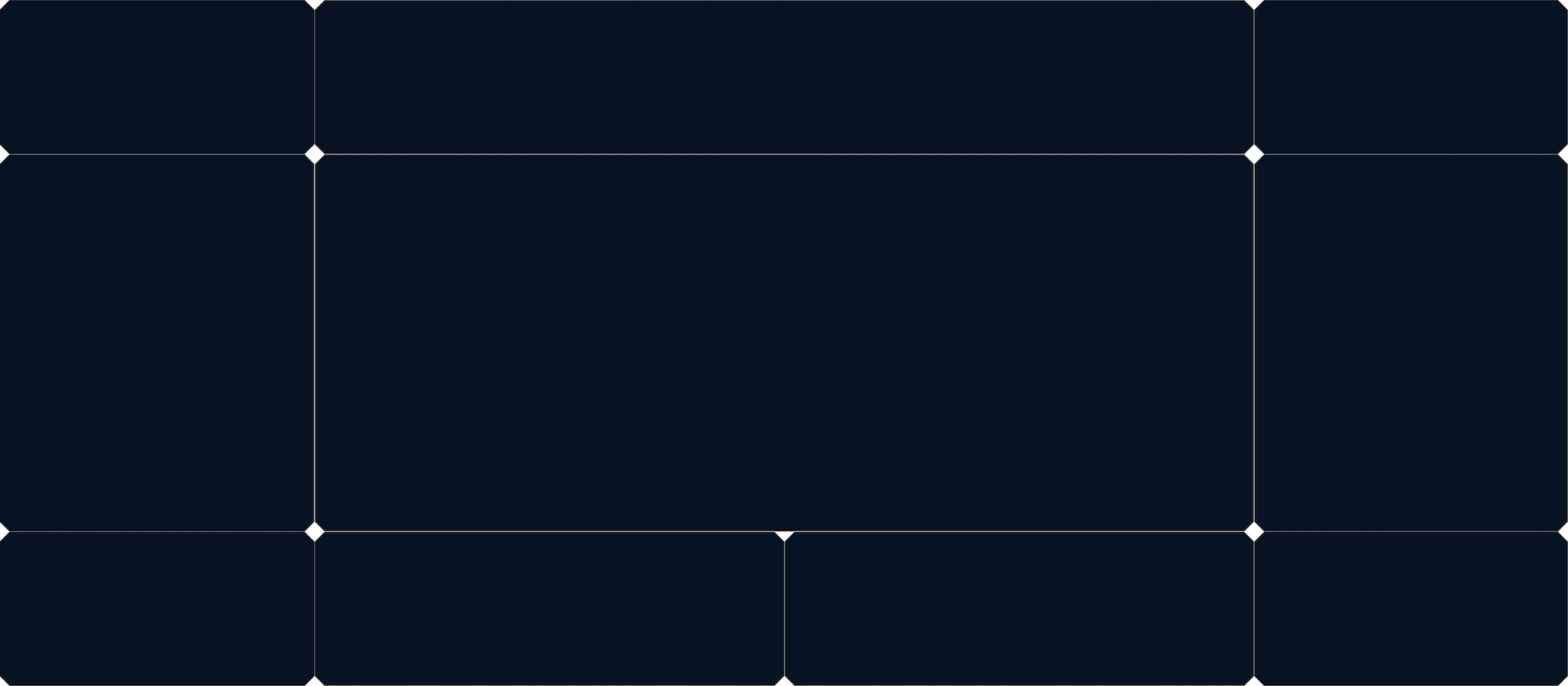
21 June 2023 Ariane Lavrilleux
Ariane Lavrilleux Rémi Labed
Rémi Labed
Revealed: Perenco’s damaging oil spills in Gabon

Revealed: Perenco’s damaging oil spills in Gabon
21 June 2023Energy giant Perenco was responsible for 17 oil leaks in Gabon in four years, research by Investigate Europe and Disclose can reveal. The affected areas in Central Africa could stretch several hundred square kilometres. Civil servants and residents have denounced the Franco-British group for its handling of the pollution.
“I want to pay tribute to the efforts that Gabon made in the past few years, it has managed to protect its primary forest,” said French President Emmanuel Macron in a video published on social media on 2 March 2023. Without a tie and the top button of his white shirt left undone, he filmed himself in a nature reserve just outside Libreville. Later that day, he headed back to Gabon’s capital for the One Forest summit, a global conference on the preservation of rainforests. “Protecting nature starts with changing our methods of production”, Macron told a room full of world leaders in his closing speech.
While Ali Bongo, Gabon’s autocratic ruler, nodded quietly a few metres from his French counterpart, an oil leak was poisoning wetlands 500km away on the shores of Lake Anengué. The pollution, which Investigate Europe and Disclose can reveal, damaged a tropical forest home to fishermen and banana farmers. It was caused by Gabon’s main oil producer: Franco-British energy giant Perenco.
The secretive company, accused of pollution around the world and under investigation in France for alleged corruption in several African countries, owns 270 oil deposits in Gabon, a country under the heel of the Bongo family since 1967. Perenco Oil and Gas Gabon extracts 100,000 barrels daily, amounting to 40 per cent of the Central African state’s production.
According to sources, the Lake Anengué pollution started on 16 February 2023 when a pipeline valve failed at Rembo-Kotto, one of Perenco’s extraction sites. “Tens of thousands of litres of oil flowed into the river and marshes where local people draw their water. Vegetation turned black and all the fish disappeared,” says a Perenco worker who requested anonymity for fear of reprisals. He filmed the damage at the end of February and shared the footage with IE and Disclose.
While Ali Bongo, Gabon’s autocratic ruler, nodded quietly a few metres from his French counterpart, an oil leak was poisoning wetlands 500km away on the shores of Lake Anengué. The pollution, which Investigate Europe and Disclose can reveal, damaged a tropical forest home to fishermen and banana farmers. It was caused by Gabon’s main oil producer: Franco-British energy giant Perenco.
The secretive company, accused of pollution around the world and under investigation in France for alleged corruption in several African countries, owns 270 oil deposits in Gabon, a country under the heel of the Bongo family since 1967. Perenco Oil and Gas Gabon extracts 100,000 barrels daily, amounting to 40 per cent of the Central African state’s production.
According to sources, the Lake Anengué pollution started on 16 February 2023 when a pipeline valve failed at Rembo-Kotto, one of Perenco’s extraction sites. “Tens of thousands of litres of oil flowed into the river and marshes where local people draw their water. Vegetation turned black and all the fish disappeared,” says a Perenco worker who requested anonymity for fear of reprisals. He filmed the damage at the end of February and shared the footage with IE and Disclose.
This is not the first time that Rembo-Kotto has been the scene of an oil spill. On 21 June 2020, 20 barrels of hydrocarbons polluted the Missala River, near Lake Anengué, as documented in a 2021 report by Gabonese authorities. A leaky pipeline was identified as the source of the pollution.
The two incidents are far from isolated. Based on unpublished testimonies, confidential documents and data from environmental activist Bernard-Christian Rekoula, Investigate Europe and Disclose found that Perenco has been responsible for at least 17 cases of pollution in Gabon between March 2019 and May 2023. Each time, mangroves, forests or the ocean were impacted.
The two incidents are far from isolated. Based on unpublished testimonies, confidential documents and data from environmental activist Bernard-Christian Rekoula, Investigate Europe and Disclose found that Perenco has been responsible for at least 17 cases of pollution in Gabon between March 2019 and May 2023. Each time, mangroves, forests or the ocean were impacted.
The dot at sea represents two incidents in 2019 and 2020.
Nine of the 17 cases were investigated by Gabon’s directorate general for environment, an arm of the environment ministry, whose findings were compiled in a May 2021 report.The equivalent of at least 290 barrels were discharged into the environment between 2020 and spring 2021, the document stated.
The report also revealed that in 2021, the number of incidents increased in a specific 10sq km area south of Port-Gentil, the country’s economic hub. On 17 January that year, a pump at the Olendé CB-1 oil field spilled into a river, discharging 50 barrels of crude oil, the equivalent of 8,000 litres that “migrated towards the mangrove”. Despite the situation, Perenco took “no action to clean up the pollution”, the report claimed. Instead, Perenco said the leak had been caused by an “act of sabotage”. The explanation did not seem to convince the report’s authors who expressed “reservations given the difficulty and danger of intervening on [this] pump in operation,” due to the “toxic and deadly gas” it can release.
A few days later, a pipeline broke in the middle of a marine park. “The impacted area is estimated to be 200 square metres,” noted the experts. During their field trip, they discovered a third incident, revealed by traces of hydrocarbons near an oil well. Initially dug by Total in 1982, it was then bought by Perenco but never put into production. According to environmental activist Bernard-Christian Rikoula, now a refugee in France, the site was not productive enough so the two groups abandoned it to avoid the costs of plugging it, despite the risks for local populations.
“Every time there’s a disaster, Perenco conceals the damages and threatens local residents, telling them that they won’t be hired again if they raise the alarm,” the Perenco employee explains.
Before every clean-up, Perenco confiscates employees’ phones to avoid compromising photos or videos, claims Yves Onanga, a temporary worker who says he was dismissed in November 2022 after denouncing the company’s methods. He claims they were simply “digging holes to bury the oil sludge that had not been removed”.
In spite of Perenco’s alleged efforts to hide pollution, the impact of some incidents was so vast that they were observed from the sky. In Spring 2019, Gabon’s space agency (Ageos) identified several oil spills near the company’s rigs in the Atlantic Ocean. “They kept on pumping anyway, even though their aging system requires huge maintenance work,” an agency official explains. “Those responsible first denied before proceeding with repairs.” He reckons that around 1,000 barrels were released into the ocean in two days. In a bulletin published in January 2021, the agency’s engineers assessed that the oil slick spread from 10sq km to 85sq km in the second half of 2019. During that seven-month period, Ageos analysis identified a further six leaks that had occurred at sea. In 2020, the affected area covered 160sq km.
“We acknowledge that incidents relating to our activities have occurred in the past,” a Perenco spokesperson said. “An impact report shows they are localised and the effects of which have been limited due to the prevention and remedial methods put in place.” The company added that it could not comment on specifics while there are ongoing legal actions, but stressed that “malicious acts” on its facilities have been frequent.
The report also revealed that in 2021, the number of incidents increased in a specific 10sq km area south of Port-Gentil, the country’s economic hub. On 17 January that year, a pump at the Olendé CB-1 oil field spilled into a river, discharging 50 barrels of crude oil, the equivalent of 8,000 litres that “migrated towards the mangrove”. Despite the situation, Perenco took “no action to clean up the pollution”, the report claimed. Instead, Perenco said the leak had been caused by an “act of sabotage”. The explanation did not seem to convince the report’s authors who expressed “reservations given the difficulty and danger of intervening on [this] pump in operation,” due to the “toxic and deadly gas” it can release.
A few days later, a pipeline broke in the middle of a marine park. “The impacted area is estimated to be 200 square metres,” noted the experts. During their field trip, they discovered a third incident, revealed by traces of hydrocarbons near an oil well. Initially dug by Total in 1982, it was then bought by Perenco but never put into production. According to environmental activist Bernard-Christian Rikoula, now a refugee in France, the site was not productive enough so the two groups abandoned it to avoid the costs of plugging it, despite the risks for local populations.
“Every time there’s a disaster, Perenco conceals the damages and threatens local residents, telling them that they won’t be hired again if they raise the alarm,” the Perenco employee explains.
Before every clean-up, Perenco confiscates employees’ phones to avoid compromising photos or videos, claims Yves Onanga, a temporary worker who says he was dismissed in November 2022 after denouncing the company’s methods. He claims they were simply “digging holes to bury the oil sludge that had not been removed”.
In spite of Perenco’s alleged efforts to hide pollution, the impact of some incidents was so vast that they were observed from the sky. In Spring 2019, Gabon’s space agency (Ageos) identified several oil spills near the company’s rigs in the Atlantic Ocean. “They kept on pumping anyway, even though their aging system requires huge maintenance work,” an agency official explains. “Those responsible first denied before proceeding with repairs.” He reckons that around 1,000 barrels were released into the ocean in two days. In a bulletin published in January 2021, the agency’s engineers assessed that the oil slick spread from 10sq km to 85sq km in the second half of 2019. During that seven-month period, Ageos analysis identified a further six leaks that had occurred at sea. In 2020, the affected area covered 160sq km.
“We acknowledge that incidents relating to our activities have occurred in the past,” a Perenco spokesperson said. “An impact report shows they are localised and the effects of which have been limited due to the prevention and remedial methods put in place.” The company added that it could not comment on specifics while there are ongoing legal actions, but stressed that “malicious acts” on its facilities have been frequent.

An oil spill caused by Perenco in Gabon’s forest. Bernard-Christian Rekoula
Since Perenco’s birth in 1992, its powerful and discreet owners, the Perrodo family, have been banking on Gabon and its immense oil reserves to amass their wealth. First, by buying up declining fields previously owned Elf, a scandal-ridden and now defunct French firm. Then, by acquiring five oil fields from Total in 2017. Perenco has since become the country’s leading producer and an influential partner of the Gabonese government, whose budget is one-third fuelled by oil revenues.
Their close ties may have even benefited Perenco. A 2021 external audit of Gabon’s extractive sector published in April suggests that although Perenco was due to pay 478 million CFA francs (€728,000) in environment taxes that year, the company paid only 200 million CFA francs (€304,000). Perenco did not explain the reasons for the alleged discount. The Gabonese government did not respond to any questions raised in this article.
Residents impacted by Perenco’s pollution also claim they have been left shortchanged by the firm. After the Olendé CB-1 pollution in January 2021, the report noted that one woman living near the affected river said in the aftermath of the spill, the only thing Perenco provided her with was bottled water. The authors also said that three weeks after the incident, Perenco was still considering whether to set up a “medical caravan” for residents complaining of “skin irritation”. It is not clear if any medical assistance arrived.
In November 2022, a fresh leak affected the same area. “Not only have the villagers received no compensation for the destruction of their resources, but Perenco is also asking us to do the dirty work,” says Yves Onanga, a fisherman hired by Perenco for two weeks to clear the latest spill around the Olendé lagoon and beach.
Faced with the prospect of no compensation, residents took their grievances to court. On 17 July 2021, Perenco was charged with causing oil pollution and damage to rivers, lagoons and the sea. The proceedings are now on hold, pending an audit of all pollution caused by Perenco, as requested by the citizens’ group behind the complaint.
Still, the Franco-British giant can count on powerful allies within president Bongo’s circles. On 2 February 2023, Adrien Broche, Perenco’s local boss, was awarded the Gabonese National Order of Merit, in the presence of the French ambassador. At least five oil spills had occurred on his watch up to that point. But that didn’t seem to tarnish the company’s reputation in the corridors of Libreville’s power.
Ariane Lavrilleux and Rémi Labed are freelance investigative journalists working with Disclose.
Translation by Maxence Peigné and editing by Chris Matthews.
#PerencoFiles is an ongoing investigation supported by the IJ4EU Investigative Support Scheme.
Their close ties may have even benefited Perenco. A 2021 external audit of Gabon’s extractive sector published in April suggests that although Perenco was due to pay 478 million CFA francs (€728,000) in environment taxes that year, the company paid only 200 million CFA francs (€304,000). Perenco did not explain the reasons for the alleged discount. The Gabonese government did not respond to any questions raised in this article.
Residents impacted by Perenco’s pollution also claim they have been left shortchanged by the firm. After the Olendé CB-1 pollution in January 2021, the report noted that one woman living near the affected river said in the aftermath of the spill, the only thing Perenco provided her with was bottled water. The authors also said that three weeks after the incident, Perenco was still considering whether to set up a “medical caravan” for residents complaining of “skin irritation”. It is not clear if any medical assistance arrived.
In November 2022, a fresh leak affected the same area. “Not only have the villagers received no compensation for the destruction of their resources, but Perenco is also asking us to do the dirty work,” says Yves Onanga, a fisherman hired by Perenco for two weeks to clear the latest spill around the Olendé lagoon and beach.
Faced with the prospect of no compensation, residents took their grievances to court. On 17 July 2021, Perenco was charged with causing oil pollution and damage to rivers, lagoons and the sea. The proceedings are now on hold, pending an audit of all pollution caused by Perenco, as requested by the citizens’ group behind the complaint.
Still, the Franco-British giant can count on powerful allies within president Bongo’s circles. On 2 February 2023, Adrien Broche, Perenco’s local boss, was awarded the Gabonese National Order of Merit, in the presence of the French ambassador. At least five oil spills had occurred on his watch up to that point. But that didn’t seem to tarnish the company’s reputation in the corridors of Libreville’s power.
Ariane Lavrilleux and Rémi Labed are freelance investigative journalists working with Disclose.
Translation by Maxence Peigné and editing by Chris Matthews.
#PerencoFiles is an ongoing investigation supported by the IJ4EU Investigative Support Scheme.




